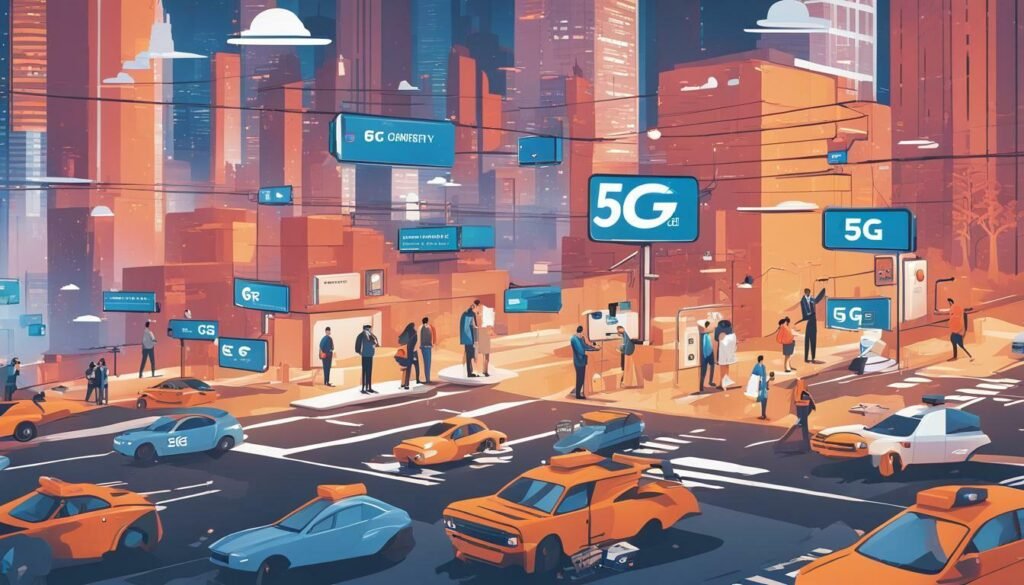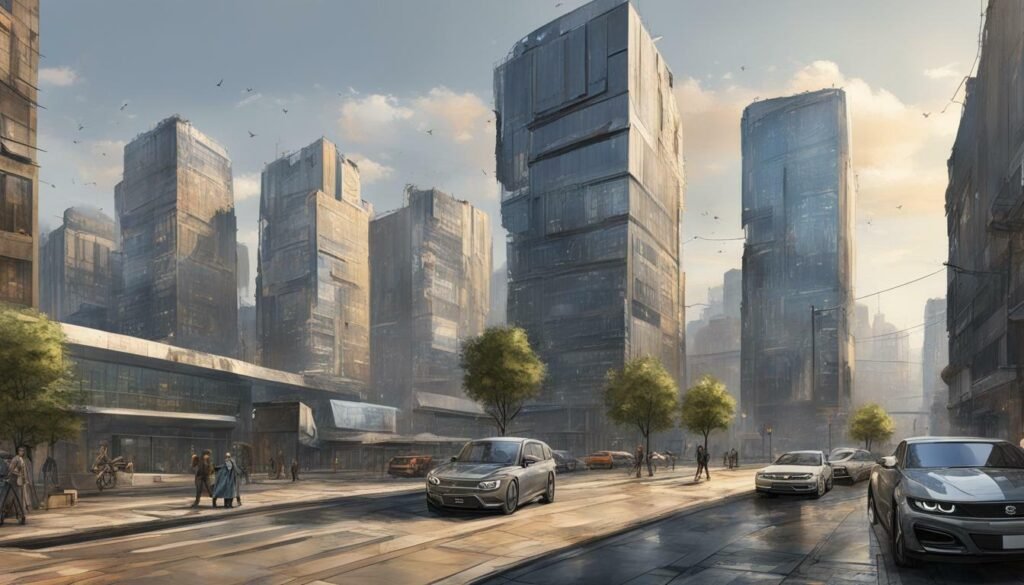As technology continues to evolve, so do our cities. Smart cities are emerging as the next big thing in urban development, leveraging the latest technologies to enhance the quality of life for citizens and improve the efficiency of public services. And at the forefront of this transformation is 5G technology.
With its enhanced speed, reliability, and capacity, 5G is poised to revolutionize the way we live and work in cities. From faster data transfer to smarter infrastructure, 5G has the potential to transform urban environments in ways we never thought possible.
Key Takeaways:
- 5G technology is set to transform smart cities with its enhanced speed, reliability, and capacity.
- The combination of 5G technology and smart cities opens up new possibilities for faster, smarter, and safer urban environments.
- Next, we’ll explore the various benefits of implementing 5G in smart cities.
The Benefits of 5G in Smart Cities
At its core, smart city development is all about leveraging technology to enhance the lives of citizens and make urban environments more efficient and sustainable. In this regard, 5G technology is a game-changer, offering a wide range of benefits that can power the next generation of smart cities.
Firstly, 5G can significantly enhance connectivity in smart cities. With its high-speed data transfer capabilities, 5G technology can support the transmission of large amounts of data in real-time, facilitating seamless communication between devices, systems, and people. This can be particularly advantageous in scenarios such as emergency response, where quick and reliable communication can be a matter of life and death.

Secondly, 5G can play a crucial role in the development of innovative applications and services in smart cities. By enabling low-latency communication and supporting high-bandwidth use cases, 5G networks can facilitate the deployment of technologies such as autonomous vehicles, augmented reality, and virtual reality, leading to new and exciting possibilities in urban living.
Moreover, 5G can enable smart city infrastructure to become more efficient and effective. By supporting the deployment of smart sensors and IoT devices, 5G networks can provide real-time data on everything from traffic patterns to energy usage, allowing for more informed decision-making and resource optimization. This can help cities become more sustainable and better equipped to handle the increasing demands of urbanization.
Benefits of 5G in Smart Cities:
- Enhanced connectivity between devices, systems, and people
- Support for innovative applications and services
- Improved efficiency and sustainability through real-time data analytics
In conclusion, the role of 5G in smart city development cannot be overstated. From enhancing connectivity to unlocking new possibilities in urban living, 5G technology is poised to transform the way we live, work, and interact with our cities. As smart city initiatives continue to gain momentum around the world, the benefits of 5G will become increasingly apparent, heralding a new era of smarter, more connected urban environments.
Building Smart City Infrastructure with 5G
Integrating 5G technology into smart city infrastructure can lead to remarkable innovations and improvements in urban planning and management. As the demand for more efficient and sustainable urban environments continues to grow, the role of 5G in supporting this transformation becomes increasingly crucial.
At its core, the integration of 5G into smart city infrastructure hinges on the deployment of smart sensors, IoT devices, and autonomous systems. These technologies can capture and analyze real-time data to inform more informed decision-making and improve resource allocation.
| Smart City Infrastructure Innovations Enabled by 5G | Description |
|---|---|
| Smart Transportation Systems | 5G technology can enable real-time traffic monitoring and dynamic routing, optimizing resource utilization and reducing congestion. |
| Smart Energy Grids | 5G can support the integration of renewable energy sources and enable more efficient grid management through real-time monitoring and control. |
| Autonomous Systems | 5G networks are essential for the deployment of autonomous systems such as drones and vehicles, facilitating remote control and eliminating the need for human intervention. |
The influence of 5G on urban planning extends beyond the technical realm. As smart city infrastructure becomes increasingly integrated, the role of policymakers and stakeholders in ensuring equitable access to these technologies becomes more crucial. Ensuring that 5G-enabled services and applications are accessible to all residents and communities must be a key consideration in the development of smart cities.
The integration of 5G into smart city infrastructure is an ongoing process, and there are still many challenges that need to be addressed. Issues such as infrastructure upgrades, spectrum availability, and regulatory considerations must be overcome to fully realize the potential of 5G in urban environments. However, with careful planning and collaboration, the benefits of 5G in building smarter, safer, and more sustainable cities are within reach.

In the next section, we will explore how 5G enhances connectivity in smart cities, unleashing new possibilities for real-time communication and collaboration.
Enhancing Connectivity with 5G in Smart Cities
5G technology presents a revolutionary approach to connectivity in smart cities. With its ultra-reliable low-latency communication (URLLC) feature, 5G offers stable and fast connections, enabling seamless communication between devices and systems. This connectivity has the potential to transform smart cities by facilitating the deployment of advanced technologies and services.
One of the key benefits of 5G is the ability to enable faster data transfer. The faster data transfer enables real-time data capture, processing, and analysis, which can enhance decision-making processes in urban contexts. For example, in transportation systems, real-time traffic data can be used to optimize route planning, reduce congestion, and improve ride-sharing services. The low latency of 5G also facilitates better user experiences, ensuring that data is received and processed quickly, leading to improved safety and efficiency.
Furthermore, 5G technology can support the deployment of smart sensors, IoT devices, and autonomous systems. These devices enable a large volume of real-time data collection, which can be used to monitor, measure, and optimize city infrastructure and services. Smart sensors can be used in public spaces to detect environmental factors such as air and noise pollution, which can help to improve public health and well-being. Autonomous systems such as drones and robots can be used in emergency services to provide rapid response and support during natural disasters, accidents, and other critical situations.

“5G technology is a game-changer in the world of smart cities, enabling faster, smarter, and safer urban environments.”
In summary, the combination of 5G technology and smart cities presents a significant opportunity to enhance connectivity, support the deployment of innovative technologies, and enable faster data transfer. This technology is poised to shape the future of urban living by offering transformative solutions to urban challenges.
The Role of 5G in Smarter Urban Living
5G technology has the potential to revolutionize how we live in cities, offering numerous benefits for smarter urban living. With faster data transfer and increased connectivity, 5G paves the way for cutting-edge technologies that can enhance the quality of life for city dwellers.
One of the key areas where 5G can make a significant impact is in energy efficiency. Smart grids, which use real-time data to optimize energy consumption, can benefit from 5G’s ultra-fast and reliable connectivity. With 5G, smart grids can communicate with connected devices, enabling households to adjust their energy consumption based on real-time energy prices and demand.
Another area where 5G can contribute to smarter urban living is in transportation. Intelligent transportation systems, which rely on data from connected vehicles and infrastructure, can improve traffic flow, reduce congestion, and enhance safety. 5G enables faster and more reliable communication between vehicles, infrastructure, and other devices, making it possible to implement more sophisticated transportation systems.
Real-time data analytics is another area where 5G can empower smarter urban living. With the ability to process vast amounts of data in real-time, 5G can enable more accurate and actionable insights into city operations. For example, 5G-powered sensors can help monitor air quality, noise levels, and other environmental factors, facilitating more effective and data-driven decision making.

Overall, 5G technology has the potential to revolutionize how we live, work and play in cities. By enabling faster and more reliable connectivity, 5G can facilitate the deployment of cutting-edge technologies that enhance energy efficiency, transportation, and real-time data analytics. As 5G networks continue to evolve and expand, we can expect to see more innovative applications and services that contribute to smarter urban living.
5G’s Impact on Safety and Efficiency in Smart Cities
One of the most significant benefits of 5G technology in smart cities is its impact on safety and efficiency. By enabling faster and more reliable communication between devices and systems, 5G can enhance public safety and optimize resource utilization in urban environments.
For instance, 5G-powered video surveillance systems equipped with advanced analytics and facial recognition technologies can help detect and prevent crime, improving overall safety for citizens. Emergency response systems can also benefit from 5G’s low latency and high reliability, enabling faster and more accurate response times in critical situations.

In terms of efficiency, 5G can enable smart traffic management systems that can dynamically adjust traffic signals and reroute vehicles to optimize traffic flow. This can lead to reduced congestion and travel times, as well as improved fuel efficiency and reduced emissions.
Additionally, 5G-enabled smart grids can more efficiently manage energy distribution and consumption while minimizing waste, leading to lower costs for consumers and reducing strain on the grid during peak usage times.
Overall, 5G’s impact on safety and efficiency in smart cities has the potential to create significant improvements in urban living, making cities safer, more sustainable, and more enjoyable places to live.
The Future of 5G in Smart Cities
As we have discussed throughout this article, 5G has the potential to completely revolutionize the way we live and work in smart cities. However, the future of 5G in urban environments is still full of untapped potential and challenges that need to be addressed.
One of the key future developments in the implementation of 5G in smart cities is the widespread deployment of autonomous vehicles. With their ability to communicate with one another in real-time, 5G-enabled autonomous vehicles have the potential to reduce traffic congestion, improve mobility, and enhance road safety.
Another exciting development is the use of 5G to power augmented and virtual reality applications in smart cities. This technology can enable immersive experiences and create new opportunities for collaboration and innovation in urban environments.
However, the successful integration of 5G into smart cities also requires overcoming several challenges. One critical issue is ensuring that the necessary infrastructure is in place to support 5G networks, including sufficient spectrum availability and fiber optic connectivity.
Another challenge is striking a balance between innovation and regulation. As 5G technology develops, policymakers will need to weigh the benefits of innovation against concerns around privacy, security, and social equity.
Despite these challenges, we believe that the future of 5G in smart cities is bright. With continued investment and collaboration between the public and private sectors, we can unlock the full potential of 5G and create urban environments that are faster, smarter, and safer than ever before.

Overcoming Challenges in Implementing 5G in Smart Cities
Implementing 5G in smart cities presents several challenges that require careful planning and execution to overcome. One of the most significant challenges is the need for significant infrastructure upgrades to support the deployment of 5G networks. This includes the installation of new cell towers, antennas, and fiber-optic cables, which can be a complex and costly process.
Another challenge is the availability of spectrum for 5G networks. The frequency bands used by 5G are different from those used by previous generations of mobile networks, requiring new spectrum allocation and management policies. This can involve navigating complex regulatory frameworks and negotiating with incumbent spectrum holders.
Furthermore, the deployment of 5G in smart cities raises concerns over data privacy and security. As more devices and systems become connected through 5G networks, the potential for cyber-attacks and data breaches increases. This requires robust security measures to be in place to protect sensitive data and ensure public trust in the technology.
Finally, there is a need for collaboration and coordination between stakeholders in the public and private sectors. This includes local government agencies, telecom operators, technology providers, and citizens. Effective communication and cooperation are crucial to ensure that 5G is deployed in a way that meets the needs and expectations of all stakeholders.
Despite these challenges, the potential benefits of 5G in smart cities are too significant to ignore. With careful planning and collaboration, we can overcome these challenges and create a truly connected, efficient, and sustainable urban environment.

The Conclusion: The Impact of 5G on Smart Cities
Throughout this article, we have explored the significant impact of 5G technology on smart cities. We have seen how the combination of 5G and smart cities can lead to faster, smarter, and safer urban environments, enhancing connectivity, enabling innovative applications and services, and supporting more efficient urban planning and management.
As 5G networks continue to evolve and expand, we can expect to see even more advanced technologies emerge, optimizing urban living and transforming the way we interact with our cities. From smart grids and intelligent transportation systems to real-time data analytics and emergency response systems, the potential for 5G in smart cities is truly limitless.
The Future of 5G in Smart Cities
Looking ahead, we can expect to see 5G technology evolving and shaping the urban landscape in new and exciting ways. However, there are still challenges to be addressed, such as infrastructure upgrades, spectrum availability, and regulatory considerations.
Despite these challenges, we believe that the impact of 5G on smart cities will only continue to grow, leading to more efficient, sustainable, and livable urban environments for us all.
Thank you for joining us on this journey of discovery, as we explored the transformative impact of 5G on smart cities.
FAQ
Q: What is 5G technology?
A: 5G technology refers to the fifth generation of wireless technology. It is designed to provide faster and more reliable connections compared to previous generations, enabling a wide range of applications and services.
Q: How does 5G impact smart cities?
A: 5G technology has a significant impact on smart cities by enabling faster data transfer, enhancing connectivity, and supporting the deployment of advanced technologies and services. It plays a crucial role in transforming urban environments into efficient, intelligent, and safer spaces.
Q: What are the benefits of implementing 5G in smart cities?
A: Implementing 5G in smart cities brings several benefits, including enhanced connectivity, faster data transfer, support for innovative applications and services, improved energy efficiency, mobility, and overall quality of life.
Q: How does 5G contribute to smarter urban living?
A: 5G contributes to smarter urban living by enabling the deployment of advanced technologies such as smart grids, intelligent transportation systems, and real-time data analytics. It improves energy efficiency, mobility, and overall quality of life in smart cities.
Q: How does 5G enhance safety and efficiency in smart cities?
A: 5G enhances safety and efficiency in smart cities through technologies such as video surveillance systems, emergency response systems, and smart traffic management. These applications improve public safety and optimize resource utilization in urban environments.
Q: What are the challenges in implementing 5G in smart cities?
A: Implementing 5G in smart cities faces challenges such as infrastructure upgrades, spectrum availability, and regulatory considerations. Overcoming these challenges is necessary to fully realize the potential of 5G in urban environments.

